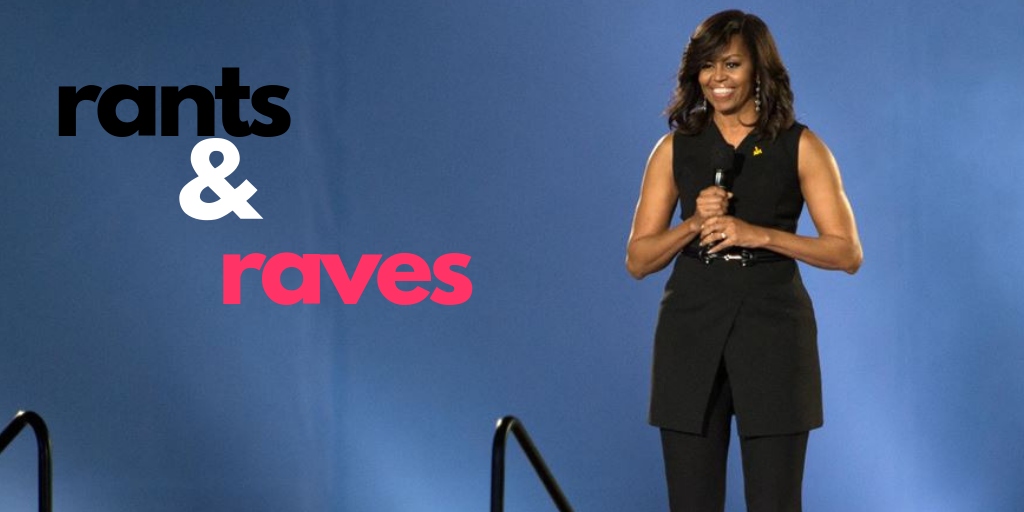Commentary on the awesome & shitty stuff female entrepreneurs are dealing with in business, pop culture & beyond …
Rave
“That’s a lie. And it’s not always enough to lean in, because that shit doesn’t work all the time.” Spoken by the badass Michelle Obama. While Obama’s sentiments were more around women balancing family and work, I’ve always said that the Lean In approach works for certain women in the corporate workplace but is not applicable to the female founders we serve.
Because our readers are not working at established organizations looking to climb the corporate ladder. We’re working our tails off to launch successful businesses, and we don’t have a company culture to combat, nor terms and policies in place, we’re trying to create all of those things from scratch. On top of that, some of us are launching startups and raising children. And, because we’re at ground zero, Lean In just doesn’t resonate with our struggle, which is why I call for successful female startup founders to author books about their journey.
So I salute Obama for candidly sharing her thoughts and being a voice to those of us who can’t relate to Lean In. That’s why around these parts, Lioness prefers to Lean The F*ck Out.
Rant
Facebook is the new Santa. Sing it with me, “He sees when you are sleeping. He knows when you’re awake. He knows if you’ve been bad or good.” According to an informative piece by The New York Times, “Facebook has allowed Spotify, Netflix and the Royal Bank of Canada to read, write and delete users’ private messages, and to see all participants on a thread.” These three companies are just one of many the tech giant has data-sharing deals with that many may describe as intrusive.
But do Facebook users even care? According to statista.com, as of the second quarter of 2018, “Facebook had 2.23 billion monthly active users.” Clearly, people are still utilizing the app despite several news reports that have highlighted data sharing concerns throughout the year.
Earlier this year, I noticed a strange coincidence. If I watched a television show (not even on my phone) or chatted extensively about a celebrity, that particular show or celeb would show up in my Explore section on Instagram the next time I logged in. It freaked me out. I went to do some research on it and found that several sites suggested I turn off Facebook’s access to my microphone. Another Times article by business reporter, Sapna Maheshwari, explained that many gaming applications were using software from a company named Alphonso that made this sort of targeted advertising possible. “The apps use software from Alphonso, a start-up that collects TV-viewing data for advertisers. Using a smartphone’s microphone, Alphonso’s software can detail what people watch by identifying audio signals in TV ads and shows, sometimes even matching that information with the places people visit and the movies they see. The information can then be used to target ads more precisely and to try to analyze things like which ads prompted a person to go to a car dealership.”
I shut off all access to my microphones and only turned them on if I needed access to post something. That only lasted for a few weeks. The back and forth became tedious and I went back to leaving access on all the time and, of course, the issue returned.
But when does too much access become, well, too much? You have to admit, Facebook has become more about convenience than anything else. I can bypass the login process on other platforms by simply clicking connect via my Facebook profile. By now, Facebook knows my news preferences, eating habits and contacts. It acts as my photo album and travel journal. And the advertising is spot on, though. It has recommended some great business opportunities that I may not have gotten wind of otherwise. It’s become that caring significant other that knows what I need before I know I need it. (Ha!) But as with most things that seem too good to be true, there are sure to be some pitfalls around the corner.
What about you? Are your privacy concerns enough to make you delete your Facebook profile?
Rant
Can we stop making songs with rapey lyrics about women in 2019? Oh, and giving us drugs, too. Please and thank you. In the last couple of months, I heard two songs with lyrics I found disturbing.
Title: Fefe
Artist: Nicki Minaj featuring Tekashi 6ix9ine
Lyric: Talk to her nice so she won’t fight back. Turn around and hit it from the back, back, back.
Title: Uproar
Artist: Lil Wayne
Lyric: If she’s iffy, there the drugs go.
I’m going to take a wild guess and say if she is fighting or if she seems iffy about the situation, the woman in question isn’t into it. Go find a woman who is. Let’s do better and take responsibility for the narratives we’re pushing.
Rave
We are tipping our hats to innovator Evelyn Berezin, developer of one of the earliest word processors. Berezin recently passed away at age 93 on Dec. 8. As recently highlighted in the Washington Post, “Berezin designed some of the earliest computer systems for banks, airlines, stock exchanges and horse tracks. And when sex discrimination stalled her career, she established her own company, Redactron, and created the Data Secretary. Essentially a computer disguised as a typewriter, it helped usher in a technological revolution as “the first mass-produced word processor,” said Chris Garcia, curator at the Computer History Museum in Mountain View, Calif.”
Thank you for paving the way for your sisters in tech.
*All opinions expressed in this column are solely those of its author.






Add Comment